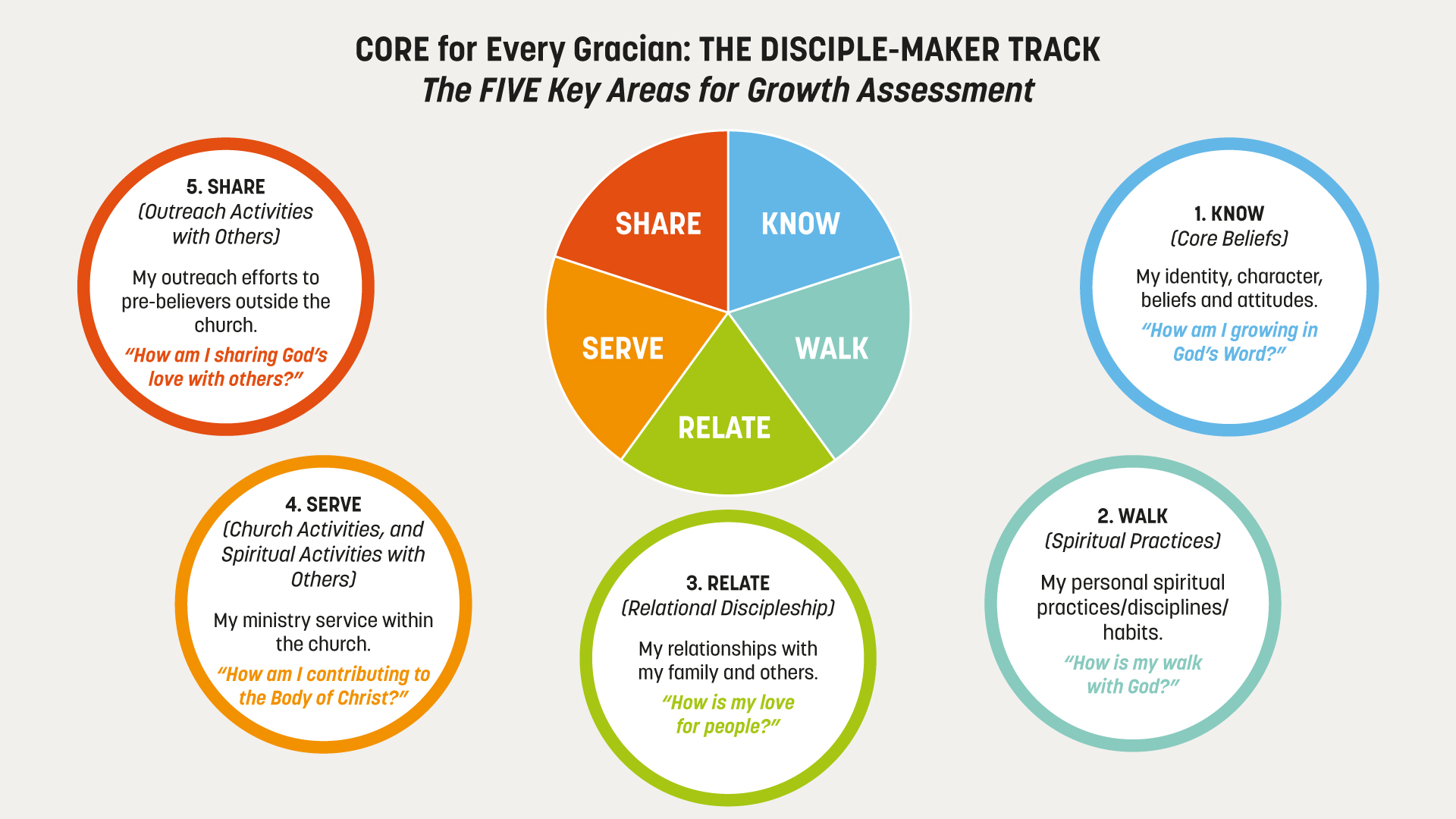
Our church vision motto: “More People, More Like Jesus” succinctly captures the call and reason of existence for every church, Grace Assembly included. It contains our two core activities – evangelism, the sharing of the Gospel with the aim of helping people come into God’s Kingdom, and discipleship, the journey of Christlikeness for those who have entered into His Kingdom.
Pastor Wilson has given the definition of Discipleship as “the process of becoming like Jesus Christ in every area of one’s being.” This is all-encompassing and comprehensive.
Jesus Christ is to be the centre, the standard, the model, the motivation, the reason and the endpoint for our discipleship. It is not about us or what we do; it is about Him and how we are becoming like Him.
“The student is not above the teacher, but everyone who is fully trained will be like their teacher (Luke 6:40; NIV).”
The effectiveness of our Discipleship Framework is measured against how enabled we are to become more and more like Christ, our Lord and Saviour.
This is a process, which means that on this side of heaven, we will not finish becoming like Christ.
“ 5For this very reason, make every effort to add to your faith goodness; and to goodness, knowledge; 6and to knowledge, self-control; and to self-control, perseverance; and to perseverance, godliness; 7 and to godliness, mutual affection; and to mutual affection, love. 8 For if you possess these qualities in increasing measure, they will keep you from being ineffective and unproductive in your knowledge of our Lord Jesus Christ (2 Peter 1:5 – 8; NIV).”
As Peter exhorts us, as long as we make every effort to keep adding His virtues to our lives, we will not be unproductive and ineffective in becoming like Christ. Progress, rather than perfection, is expected.
The extent of this becoming like Jesus Christ is in every area of one’s being. In the private, the public, the family, the workplace, the home, and the marketplace, our becoming like Jesus Christ must be evident. This 360° Discipleship requires us to come up with a holistic approach.
To address all these aspects of discipleship, we have three tracks, of which the core is termed “The Disciple-Maker Track”. This core track is for every Gracian.
We began by asking how we are to assess the holistic development of a disciple. The typical discipleship program creates classes with the appropriate content and environment that are geared towards the envisioned change and growth. While Scriptural and Spirit-led content and teaching are powerful as foundation for discipleship, they nurture only one aspect and not ‘every area’.
Hence, we came up with an assessment in the Five Key Growth Areas, which cover the whole development of a person, and couched in simple and easy-to-translate verbs:
1. KNOW
Sound, true and right knowledge is a vital starting point. Jesus is the Word and He reveals the Godhead through the Scriptures. It is this ongoing quantitative and qualitative engaging with God’s Word, through personal Bible reading, courses, classes, seminars and Bible studies that builds a biblical worldview in understanding God’s purpose and mission for us, and who we are in Him; including our identity, beliefs, character and attitudes. So instead of asking how many classes we have attended, which may or may not be an accurate indicator, we ask, “How are we growing in God’s Word?”
2. WALK
Cognitive development, though, essential, is inadequate because “knowledge puffs up (1 Corinthians 8:1b)”. It is not the hearing of the Word but putting the Word into practice that is commended (James 1:22). The Word of God should translate into spiritual disciplines, real-life application, and empower our day-to-day interactions, behavioural change and habit formation. The point of interest is, “How is our walk with God?”
These first two pertain to our personal growth and development as disciples.
3. RELATE
To know that we are loved by God and to love Him in return is very fulfilling but the greatest commandments according to Jesus is not just loving God (the vertical relationship) but loving people as well (the horizontal counterpart). Disciples must go beyond self-care and self-preservation to caring for the family of God, from personal expressions of faith to corporate, and from being individual-focused to community-focused. Relational discipleship consists of small groups where spiritual mentors and spiritual parenting is in place to impart Christian values and biblical principles life-on-life. While our love of God must be our primary motivation, here we want to consider, “How is our love for people?”
4. SERVE
Under the leadership of the Holy Spirit we want to discern and discover the gifts that He has given to the Body of Christ. This gives us our roles in the Body – areas where our gifts come into play in edifying the church of God. Under Christ’s Headship we all have an important part in ministering together. As we have freely received, so we freely give and offer our worshipful service. We need to ask, “How are we contributing to the Body of Christ?” Our service is an important gauge of our growth as disciples of Christ.
5. SHARE
The members of a church exist to bless those who are outside the Church. We are to be Christ’s witnesses to those who are beyond the walls of our premises. As Christ’s ambassadors, we are translated from being of the world into God’s Kingdom and to be sent back from the Kingdom into the world. In this sense, everyone is either a missionary or a mission-field! Every disciple must have an outlet and an output of being and sharing the Gospel of Jesus Christ to pre-believers; first, to those in our household, then to those at our workplace, community and the nations. The success of discipleship is not in the number of years but in the number of people, family members, and acquaintances we have the privilege and opportunity to share: “How are we sharing God’s love with others?”
With these five areas one can determine if one is growing healthily or in a lop-sided fashion. Only healthy disciples can be strong and able disciple-makers, who in turn, produce healthy and balanced disciples.

